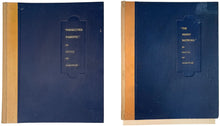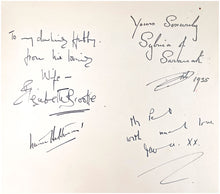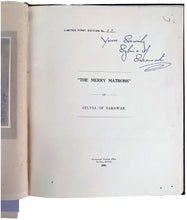
The only works for the stage by Sylvia of Sarawak ever performed and printed in sarawak
BROOKE, Lady Sylvia [née BRETT], SYLVIA OF SARAWAK, second Ranee of Sarawak. Persecuted Parents … A Play about everybody else's Children, every Mother will tell every other Mother to go and SEE. Kuching, Sarawak: Printed at the Government Printing Office by W. J. Chater, Acting Government Printer. 1935.
4to. Original publisher's calf-backed dark blue cloth, front cover lettered in gilt within embossed shield; pp. [ii], 77; spine with paste-paper restorations, minor traces of worming to the inside of the lower boards, tiny wormholes to upper outer corners of text; a rare survival of a stage play acerbically dissecting double standards of family life and motherhood.
Extremely rare sole edition, association copy inscribed by the author and leading actor on front fly leaf, further inscribed by Dayang Elizabeth to her husband, together with a finely printed folding flyer announcing the staging at the Sarawak Club, and the playbill printed in red and black, stating that an autographed limited first edition of the play will be sold during the performance, price $2.50.
'Before marrying into the last generation of the Brooke dynasty, Lady Sylvia was a young and successful writer under the tutelage of British literary giants George Bernard Shaw and J.M. Barrie. She published early, and often, amassing an impressive publications list by any measure in the genres of novel, short story, stage play, film treatment, and essay throughout her life. She was an impassioned voice in defense of those marginalised from society, from London’s impoverished working class to the many disenfranchised natives and minorities of the British Empire … One of Sylvia’s three surviving plays, is available at just five WorldCat member libraries; and The Merry Matrons (1935), another of her three surviving plays, is available at only one WorldCat member library worldwide (the British National Library). Persecuted Parents (1935), the last of her three surviving plays, is no longer held at any WorldCat member libraries, though it is available in the archives at Oxford’s Rhodes House, with a copy now also available here in Sarawak at the state library. This relative paucity in numbers of copies of her works available in libraries around the world, particularly her older works, reflects less the literary and historic value of her work, and more her gradual marginalisation from history due to efforts (such as Eade’s) to emphasise her outrageousness and/or eccentricity as Ranee, while de-emphasising her many contributions as a writer. Indeed, getting to know Lady Sylvia from her written works, one encounters a passionate and principled defender of the rights of the many occupied, displaced and marginalised peoples in the British Empire, and a noteworthy author of the colonial world who had a front-row seat to colonial administration' (Scott Zellen).
This play is set in an upper class household supported by a mostly absent father, a top surgeon. Lady Balfour was played by Sylvia, the mother of three daughters, the oldest considered a spinster because she had been denied the desired medical education, and the two younger and spoilt ones were played by Sylvia's daughters, Dayang Elizabeth (RADA educated, singer, actress and married to Harry Roy, a dance band leader) and Dayang Valerie, and actress as well, known for the 1936 film The Charge of the Light Brigade. The play evolves around double standards of this family (the mother who idolizes her absent husband has a lover), the youngest daughter is full of a sense of entitlement ('Hurrah … I'm the first. I always adore being first, don't you … it makes you feel so superior' - p. 13). One can imagine the electrifying atmosphere in the Sarawak Club on the evening of February 23, 1935, when the Ranee and the two princes are washing dirty linen about hypocrisy and double standards of upper class family life, and scrutinize the role of women in society, in front of an audience of white Colonials.
[Together with:] BROOKE, Lady Sylvia [née BRETT], SYLVIA OF SARAWAK, second Ranee of Sarawak. The Merry Matrons. Kuching, Sarawak. 1935.
4to. Original publisher's calf-backed dark blue cloth, front cover lettered in gilt within embossed shield; ff. [ii], 11, printed on rectos only; spine with paste-paper restorations, traces of worming to the inside of the boards, wormholes to margins; a rare survival of a light entertainment performed on Christmas Eve, 1935.
Extremely rare sole edition, presentation copy inscribed by the author on title-page, original mounted silver gelatine photo of a stage scene tipped in opposite title-page.
One of the author's daughters, Dayang Valerie is on the cast list. - Loosely inserted the six-page advertisement for the full programme of "A Christmas Stocking", the variety programme to be performed by the Kuching Amateur Dramatic Society at the Sarawak Club, of which the play was the concluding piece of the evening, after Half-an-Hour by J.M. Barrie, two further plays and musical entertainment. This play is set in 'any Club House anywhere in the Far East', and is described as 'a Comedy of 1940 when Young Men May Be Scarce' (p. 10). It is a short farce of Colonial women, older and young, eagerly expecting the arrival of a young cadet to be stationed in the town. Disappointment all around when he appears with his wife and two children. - 'A few, such as her play, The Merry Matrons, remain with us most tenuously in the form of just one, sole-surviving copy (held in the British National Library’s archives)' (Barry Scott Zellen). The two plays offered here are the only plays to be written and performed by Sylvia in Sarawak, and the last plays she wrote. They are of utmost rarity and no copy has ever appeared on the market, as far as we could trace.
Provenance: Elizabeth Broke Vidmer, Sylvia's daughter, hence by descent.
See Barry Scott Zellen, The 'Forgotten Hemingway' of Sarawak's Literary Borderlands: Rediscovering the Prolific Literary Oeuvre of Ranee Sylvia Brooke in: Sarawak Museum Journal, 2018.
#2120220







